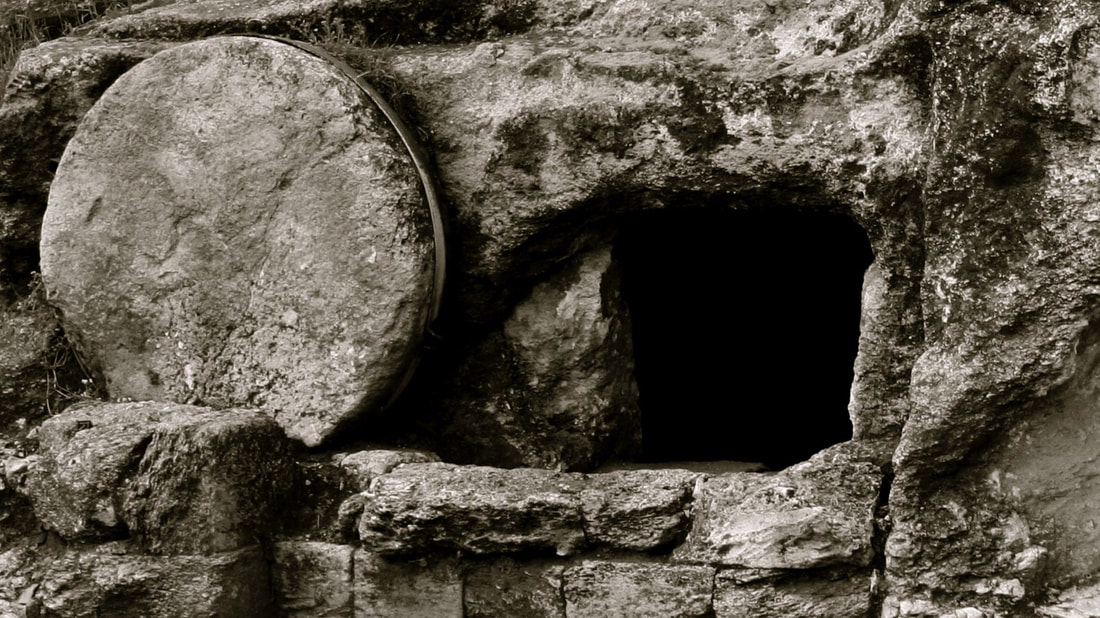v1 Spices.
Mary Magdalene, James’ mother also named Mary, and Salome intended to anoint Jesus’ body with spices. It was an act of homage in belief that for their loved one death was a permanent condition. The women were performing an act of affection and respect and endeavoring to preserve a corpse for as long as possible. They had to do something immediately until their mood of mourning would gradually be transformed into manageable and cherished memory. Practical adjustments are necessary in order to cope with acute loss. Ceremony yields a small measure of comfort in bereavement. It is a token of farewell.
v2 On their way to the tomb.
The sorrowing party of devoted women were preoccupied with the pending problem that bothered them on their excursion to the tomb where Jesus lay. The grave hewn out of a rock face was sealed with a huge stone that could possibly be rolled along a runner, or shallow channel etched into the ground, if pushed with force and effort, a task too difficult for the small team off women approaching Jesus’ burial place. Their minds were agitated by a seemingly insoluble problem.
v4 The large stone had been rolled away.
Heaven had intervened. The women looked up and the stone had been moved aside. The tomb was open to the worried visitors. Then one of the angels within the tomb explained the absence of the body of the Lord. “He is not here.” The crucified one for whom the women were looking was no longer where he had been laid. The shelf carved out of the wall of the tomb where Jesus had been placed was no longer occupied by the dead. Only heavenly messengers of the resurrection were visible in the silent cave. They assured the stunned observers that there was no need for alarm. All was in accord with divine arrangement.
v7 Going ahead into Galilee.
Jesus would fulfill his pledge to his disciples and reunite with them in Galilee. The risen One had gone ahead to the appointed place of meeting. It was there that his beloved brethren would see him (Matthew 28:10). Jesu, Joy of man’s desiring, would grant his followers joy on familiar soil. The gospel of the resurrection has to be “earthed” and proclaimed where ordinary folk walk and work, sit and stand. It is the message of the new world bringing hope to the old world of sin and death. The place of former ministry receives new power.
Tell his disciples and Peter.
It is understood that Mark’s Gospel is the written record of Peter’s dictated memoir of Jesus and his ministry of speech, action, and sacrifice. The special mention of Peter is poignant to the apostle and to us. Peter is known for his differences with the Lord and his denials of the Lord. With bitter hindsight Peter recognized his sin and failure as a strong tendency in his character, and a regrettable trend in his discipleship. But Jesus’ love and loyalty to this unstable man were unbreakable. Peter was candid about his cowardice and profoundly moved by his Savior’s companionship and service of the kingdom.
“Tell Peter” was an affectionate message to a man of notable failure (as was Mark his fellow in human frailty: Mk 14:51-52, Acts 15:37-39). Peter and Mark collaborate to bring us the gospel of forgiveness and new beginnings (2 Tim 4:11, Colossians 4:10, Philemon v24). He has risen! is the confident apostolic message to the church. He is alive! is the church’s confident message to the world.
RJS





 RSS Feed
RSS Feed
